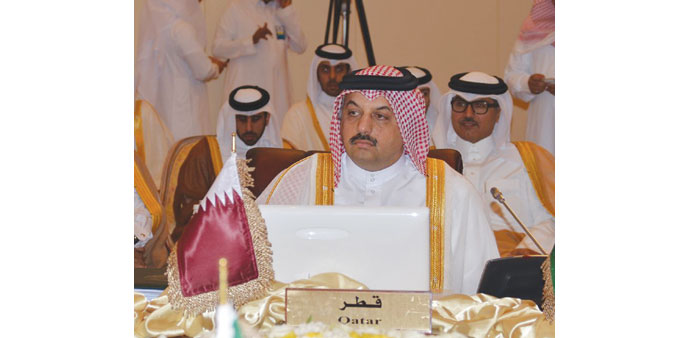Agencies
Jeddah
|
|
Kuwait’s First Deputy Prime Minister and Foreign Minister Sheikh Sabah al-Khalid al-Hamad al-Sabah said yesterday that the Saudi, UAE and Bahrain ambassadors could return to their posts in Qatar “at any time”.
He was talking to reporters after the 132nd session of the GCC Foreign Ministers Council here.
Qatar was represented at the session by HE the Foreign Minister Dr Khalid bin Mohamed al-Attiyah.
Sheikh Sabah said the Jeddah meeting dealt with “some of the issues related to joint GCC work”, according to a Qatar News Agency (QNA) report.
He said the foreign ministers had placed “standards to overcome shortcomings in the future”.
“He stressed that all GCC member countries were not happy at the obstacles of the past and are keen to overcome them, adding that the need to advance joint GCC work had become more urgent in light of the threats surrounding the region,” QNA said.
He stressed that such threats would not obstruct the GCC joint work that had been ongoing for the past 33 years.
As for the return of the ambassadors to Qatar, Sheikh Sabah revealed that it could happen “at any moment”.
He added that the council had placed a mechanism for overcoming obstacles and “as a result the return of the ambassadors could happen at any moment”.
In March this year, Saudi Arabia, the UAE and Bahrain withdrew their ambassadors from Doha over some differences of opinions.
The AFP news agency quoted Sheikh Sabah as saying that the GCC had resolved differences among some member states.
Sheikh Sabah said differences were settled because unity was needed to face the common threat posed by Islamic State (IS) militants.
His Omani counterpart, Yousef bin Alawi bin Abdullah, also told
reporters the issue had been settled.
“The crisis in the Gulf has been resolved,” the Omani minister said after the ministerial council session.
He also said the Saudi, UAE and Bahrain ambassadors would return to their posts in Doha.
During a joint press conference with Sheikh Sabah, GCC Secretary-General Dr Abdul Latif bin Rashid al-Zayani said the meeting had reviewed the progress of joint work as well as developments of regional issues.
The GCC states said at the meeting they were ready to help counter advances by militants in Syria and Iraq, after the US called for a
global coalition to fight the extremists.
But the six-nation alliance said it was awaiting details from Washington and a visit to the region by US Secretary of State Department John Kerry to discuss anti-militant co-operation.
US President Obama admitted on Thursday that he did not yet have a strategy to tackle militants from the Islamic State, which has declared a “caliphate” in large swathes of territory it controls in Syria and Iraq.
But Obama said he was developing a broad plan that would involve military, diplomatic and regional efforts to defeat the IS militants who have sown terror through crucifixions
and gruesome beheadings.
Obama said he would dispatch Kerry to the Middle East to discuss the plan with regional allies.
“We have all heard what President Obama said about a coalition and that he has asked John Kerry to travel to the region to set it up,” said Sheikh Sabah.
“We are waiting for more details to understand what is needed... We are waiting for Kerry,” he added.
A GCC statement later said member states were ready to act “against terrorist threats that face the region and the world”.
The foreign ministers of Bahrain, Kuwait, Oman, Qatar, Saudi Arabia and the United Arab Emirates - the six GCC states - pledged a readiness to fight “terrorist ideology which is contrary to Islam”.
“We denounce vehemently the practices of those who use Islam as a pretext to kill and displace en masse Iraqis and Syrians,” Sabah said.
He added that the GCC supports a UN Security Council resolution earlier this month aimed at weakening the militants.
The mid-August resolution called “on all member states to take national measures to suppress the flow of foreign terrorist fighters”, and threatens sanctions against anyone involved in their recruitment.
Kerry, in an op-ed published on Friday in the New York Times, said Washington would submit a plan to deal with the jihadists at the Security Council in September.
“What’s needed to confront its nihilistic vision and genocidal agenda is a global coalition using political, humanitarian, economic, law enforcement and intelligence tools to support military force,” he said.
There is growing alarm that IS militants, who this month beheaded US journalist James Foley in Syria, are preparing to carry out attacks in the West.
In his opening speech at the session, the Kuwaiti Foreign Minister warned that the GCC states were facing a growing threat of terrorism by groups that use Islam to justify the murder and displacement of peaceful civilians, criticising those groups as being “ far from its (Islam’s) tolerant humanitarian message”.
Commenting on the latest developments in the Palestinian issue, the Kuwaiti foreign minister welcomed the ceasefire agreement reached on August 26 between the Palestinian and Israeli sides.
He then called on the international community to activate United Nations resolutions related to the conflict and provide protection for the Palestinian people, as well as lift the Israeli siege imposed on the Gaza Strip.
He said that the crises storming through the Arab world and leading to rising death tolls in different areas called on the GCC to stress its commitment to the stability of the region, adding that the council was willing to help to reach that goal.

